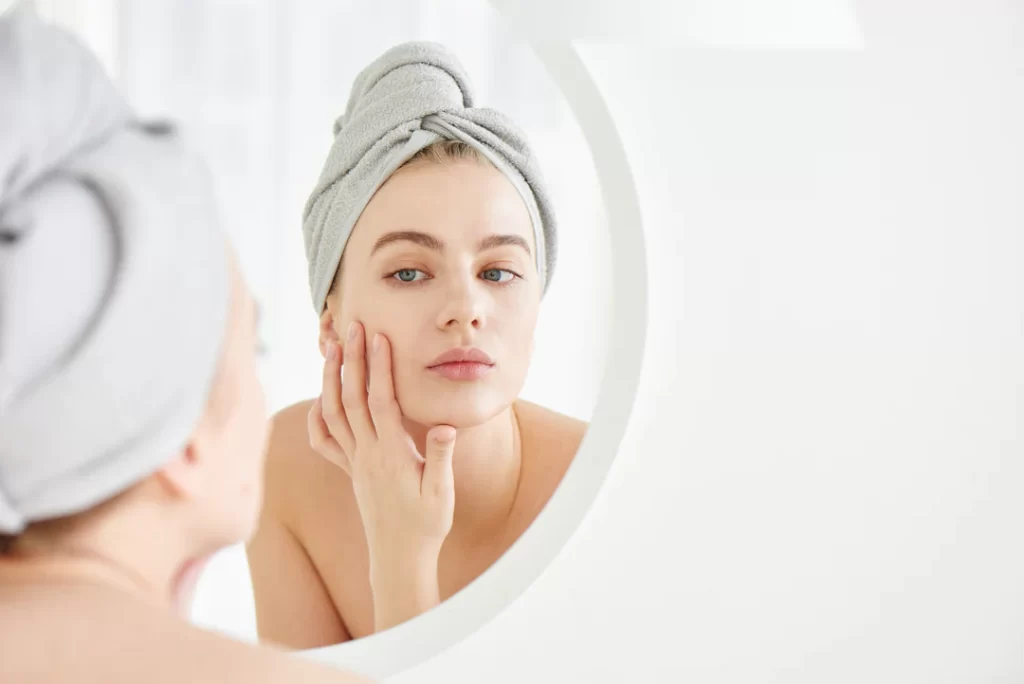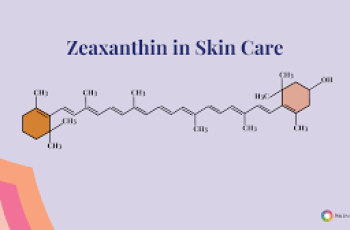
Why Can’t You Use Vitamin C and Peptides Together?
Peptides and vitamin C are two ingredients that are often found in many skincare products. Both are very popular in their own right and provide impressive skin results when applied to the skin separately. The question is, are they able to perform the same when used in the same product formulation. Today we are going to investigate why can’t you use vitamin C and peptides together and with any luck we will clear up any confusion there is circulating these two powerhouse ingredients and the benefits they deliver to the skin.
Can I use peptide and vitamin C together?
Yes, you can use peptides and vitamin C together. It is known that peptides are able to work in tandem with other popular ingredients, it’s a simple case of choosing your ingredients wisely. What I mean by this is opting for ingredient combinations that benefit the skin and keep the barrier strong and healthy. This in the long run will keep your complexion looking notably younger, firmer, and full of bounce.
When it comes to vitamin C and peptides working together you may find that if you are prone to sensitivity or have a dry skin type, using these ingredients together will result in the skin becoming irritated, flushed, and suffering from redness. This doesn’t mean that if you have a skin type that is oilier or combination you won’t suffer from any sensitivity, as minor or severe as it may be. For this reason, I would suggest consulting with a doctor or dermatologist about the best way of using these ingredients in your everyday routine.
So, if you are wanting to use peptides and vitamin C together, I would suggest alternating the time of day you apply each ingredient onto the skin. This allows you to reap the rewards of peptides and vitamin C whilst avoiding any unwanted side effects and irritation.
Why can’t you use vitamin C and peptides together?
As I have already mentioned, peptides and vitamin C deliver pretty impressive results single handily. There are some mixed reviews on the idea of using both ingredients together, but generally speaking teaming these ingredients is an easier task than you’d expect. Vitamin C has highly impressive results at combating an array of skin stresses, such as environmental aggressors that lead to oxidation stress on the skin. This can come in a variety of uneven skin tone, such as dark spots and hyperpigmentation as well as premature signs of ageing, such as fine lines and wrinkles.
With vitamin C delivering antioxidant benefits to the skin surface, you’ll find that it is able to protect the new collagen produced thanks to the peptides sending signals to the lower layers of the skin.
What goes on first peptides or vitamin C?
This is very much dependant on the consistency of the formula containing peptides and vitamin C. As I have already mentioned in previous blog posts, there is a rule in how skincare products should be applied. Starting with the thinnest and moving onto the thickest, this will ensure each product is able to absorb into the skin fully without having to compete with barrier created by thick creams and face oils.
So, for example, if you have a vitamin C enriched serum and a moisturiser packed with copper peptides then applying the serum first followed by the moisturiser will ensure your skin gets the best out of each ingredient.
Can you use vitamin C in the morning and peptides at night?
Yes, you certainly can! Vitamin C is one of the most potent antioxidant ingredients available in over-the-counter skincare ingredients. Due to the impressive ability to combat hyperpigmentation, dark spots and even the first signs of ageing, many feel applying vitamin C in the morning deliver optimal results. With the skin barrier being fully protected from the antioxidant benefits of vitamin C you can then reenforce these benefits by following this with peptide enriched product in the evening. Whilst you sleep you have limited exposure to free radicals, such as UV rays or pollution, resulting in the peptides working in the lower layers of the skin completely undisturbed.
By using each of these ingredients this way, you can expect to find your skin to transform completely, resulting in a healthy, luminous, and youthful complexion.
Which is better vitamin C or peptides?
This is down to personal preference, as each ingredient provide their own unique benefits.
Skincare benefits of vitamin C
Potent antioxidant that provides protection from free radical damage, such as pollution, environmental aggressors, central heating, and UV exposure.
It can trigger the skin into healing itself ensuring collagen and elastin production are given an impressive boost.
Combats signs of premature ageing, such as fine lines, wrinkles, and loss of firmness to the skin.
Reduces the appearance of hyperpigmentation, even skin tone and dark spots
Significantly brightens the complexion
Removes dead skin cell build-up on the surface of the skin
Skincare benefits of peptides
Improves the strength of the skin barrier
Reduces the appearance of fine lines and wrinkles Helps to firm the skin by boosting collagen and elastin production Calms inflammation and repairs damaged skin Combats acne causing bacteria giving you skin clarity Leaves the skin feeling plumped, hydrated with a youthful bounce Now that you have had a recap of the benefits of each powerhouse, this should help you decide about which ingredient would benefit your routine. Of course, there isn’t anything stopping you from teaming them together by applying them of alternate days, or different skincare routines throughout the day. Are peptides or retinol better? Again, this is something that can be decided by you personally with the skin concerns you wish to address. Retinol is, of course, one of the most potent anti-ageing skin ingredients. Its fast results will never fail to amaze people, but with this comes the downside of increased sensitivity of the skin. Peptides on the other hand are able to deliver similar results, but in a gentler way, having said that you may find the time and results achieved by peptides may not live up to the effectiveness of retinol. If you are wanting to find out more about whether you can use peptides and retinol together, check out our blog post. There you hopefully have some questions cleared up for you about peptides and vitamin C. Always remember that if you have any concerns with new formulas or ingredients consult with your doctor or dermatologist. Don’t forget to come and follow us over on Instagram.
DQH Knowledge drop: In your 20s, your skin cell turnover decreases. (Cell turnover is a key component in keeping your skin youthful.) You know what else slows down? Your collagen production. Starting in your 20s, collagen decreases by about 1 percent per year. Should you want to prevent fine lines and wrinkles, start by eliminating behaviors that contribute to premature aging. “If it’s bad for you, it’s bad for your skin,” says dermatologist Michel Somenek.
“Cigarette smoking reduces blood flow to the skin and causes premature wrinkling and a dull skin texture. Making the repeated pursed motion to inhale can also cause smoker’s lines. Alcohol and recreational drugs are toxins for the skin that damage its cellular structure and DNA,” Somenek tells us. “The faster you eliminate vices while you are young, the better chance your skin and body have to recuperate.” Also, adopting an anti-aging routine in your 20s is key. After all, the best offense is a good defense. We spoke to Somenek and experts Joshua Ross and Audrey Kunin to find out more.
Keep reading for the best anti-aging products for your 20s, according to skincare professionals.
Sunscreen
“We all know that the sun is the number one cause of skin aging and starting the prevention in your 20s is very important,” Ross says. “The majority of your sun damage won’t start to appear until you’re in your 30s, so don’t wait until you see it surface or you’ll be behind the curve. Stay ahead of it with a good-quality zinc-based sunscreen worn daily.”
Farmacy Green Defense Daily Mineral Sunscreen
An invisible sunscreen with SPF 30, plus botanical extracts meant to protect skin with tons of antioxidants. Bonus: It’s clean and fine to use under makeup.
Bareminerals Complexion Rescue™ Tinted Moisturizer Broad Spectrum SPF 30
Although we recommend you use your SPF and moisturizer separately, we also understand moments when you don’t have time or energy for that extra step. For those times, this bareMinerals moisturizer is a great thing to have on hand.
Vitamin C Serum
“A great introduction to anti-aging is to start with a vitamin C serum in your morning skincare routine,” Ross says. “It’s a powerful antioxidant that will neutralize free radicals and brighten the skin.” He adds that it’s a great way to counteract the effects of the sun’s harmful rays, which, as previously mentioned, are among the biggest causes of premature aging.
Drunk Elephant C-Firma™ Vitamin C Day Serum
The Drunk Elephant C-Firma is a lightweight serum that promises to give skin a glow by combining the brightening powers of vitamin C with ferulic acid, l-ascorbic acid, and vitamin E. The included sodium hyaluronate is meant to replace hydration loss, so you shouldn’t have to deal with any irritation.
Sunday Riley C.E.O. Rapid Flash Brightening Serum
This potent serum is jam-packed with vitamin C (15 percent, to be exact), which means it’s a potential superstar at both brightening skin and dousing it in antioxidants.
Peptides
Using peptides on your skin has many benefits, says Somenek. “The skin barrier is what defends the body against pollution, UV rays, bacteria, and toxins. It can be damaged by several everyday factors. Using topical peptides aids in building a stronger barrier,” he says. “Peptides comprise elastic fibers, which are a type of protein. These fibers help to make skin appear taut and firm. Peptides can also help repair damaged skin, relieve inflammation, and even out skin tone. Some peptides can kill acne-causing bacteria that is common in 20-somethings.”
Kunin agrees, saying, “Peptides are an excellent entry point for supporting collagen.” She recommends looking for face and eye treatments that contain these collagen-boosting powerhouses.
Charlotte Tilbury Magic Eye Rescue Cream
This Charlotte Tilbury super-emollient eye cream has a base of coconut oil and shea butter (read: it’s incredibly hydrating). Botanicals plus peptides are meant to help reduce dark circles and boost collagen, respectively.
This creamy moisturizer serves up potent collagen-boosting peptides and pycnogenol, and antioxidant-rich vitamin C. “Instead of sitting on top of the skin, peptides penetrate the outer layer so they go deep. The ‘signals’ they send tell the cells to produce elastin and collagen, which are needed for youthful-looking skin,” explains Somenek.
At-Home Peel Pads
Remember that skin cell turnover fiasco we talked about earlier? One way to help support it is by exfoliating. “Exfoliation is important to help keep skin fresh and luminous,” Kunin says. She recommends using at-home peel pads as an easy and effective way to exfoliate.
“The goal in your 20s is to fight the slowing pace of cell turnover. It is wise to use products that gently exfoliate, yet still remove oil and other impurities. Products that have Alpha Hydroxy Acids (AHA) or Beta Hydroxy Acids (BHA) are a good choice.”
According to Somenek, you should only exfoliate two to three times a week. “People of all ages are guilty of over-exfoliating and that can be too much of a good thing,” he says.
Dermadoctor Kakadu C Intensive Vitamin C Peel Pad
A few swipes of this Derma Doctor powerful peel pad promise to leave your skin glowing and smooth, thanks to the seven (yes, seven) types of chemical exfoliants, including AHA and BHA. It also contains vitamin C via Kakadu plum extract for added brightening and antioxidant protection.
KEY INGREDIENTS Kakadu plum extract is sourced from the Kakadu plum, a fruit grown in northern Australia. It contains vitamin C, which restores the skin’s natural barrier, increases collagen production, and soothes irritation.
Dr. Dennis Gross Skincare Alpha Beta® Universal Daily Peel Pads
These are the gold standard of peel pads, with a cult following and over 900 five-star reviews on Sephora. They’re easy to use and contain a blend of anti-aging exfoliating acids.
Emollient Night Cream
“In your 20s, you need to start upping the hydration in your skincare routine. You may have been cautious of over-moisturizing because of acne in your teens, but as you enter your 20s, your skin transitions and becomes drier,” Ross says. “I recommend an emollient night cream added into your evening skincare regimen.”
“Twenty-somethings need to make sure that they are not using creams that will clog their pores and cause excess oil production,” says Somenek. Opt for non-comedogenic products.
Cerave Skin Renewing Night Cream
One great choice is the CeraVe Skin Renewing Night Cream, which is a non-comedogenic night cream that leaves skin soft and glowy. It combines the moisturizing powers of ceramides and hyaluronic acid.
RoC Retinol Correxion Max Hydration Creme
“The best night cream ingredients contain retinol, benzoyl peroxide, and/or salicylic acid or hyaluronic acid. The goal is to moisturize, yet remove excess oil,” says Somenek. This Roc Retinol Correxion cream fits the bill as it contains both hyaluronic acid and retinol so it promises to moisturize while also being non-comedogenic.


